The common narrative around mental illnesses is that they make you feel miserable and dysfunctional all the time. So logically, it’s better to steer clear of people dealing with such issues. Even more so in the workplace, where profits and results are often valued more than the long-term mental health of employees.
As a result, there’s a big stigma when it comes to openly discussing issues of mental health. This prevents people from finding the support they need, which begins a vicious cycle of neglect, shame, and insufficient support. We felt it important to de-stigmatize mental health disorders with a narrative based on data.
Our large-case survey of 5,521 respondents shows why it’s important to get rid of this stigma:
- 88% of respondents experienced mental health issues in the past year.
- On average, a person struggles with 3 mental health issues.
- One in four people is diagnosed with a mental health disorder.
- 25% of people don’t feel comfortable sharing their struggles with anyone.
- People are least likely to share their issues with their manager(s) at work.
- On average, people who struggle with their mental health are 23% less happy.
- 14% of respondents don’t seek help out of shame or embarrassment.
These observations, and many more, are covered in this in-depth analysis of our study.
88% of respondents experience mental health issues
We asked our respondents the following questions:
- Over the past year, have you experienced any of the following mental health issues?
Out of 5,521 respondents, a total of 4,875 stated to struggle with at least one mental health issue.
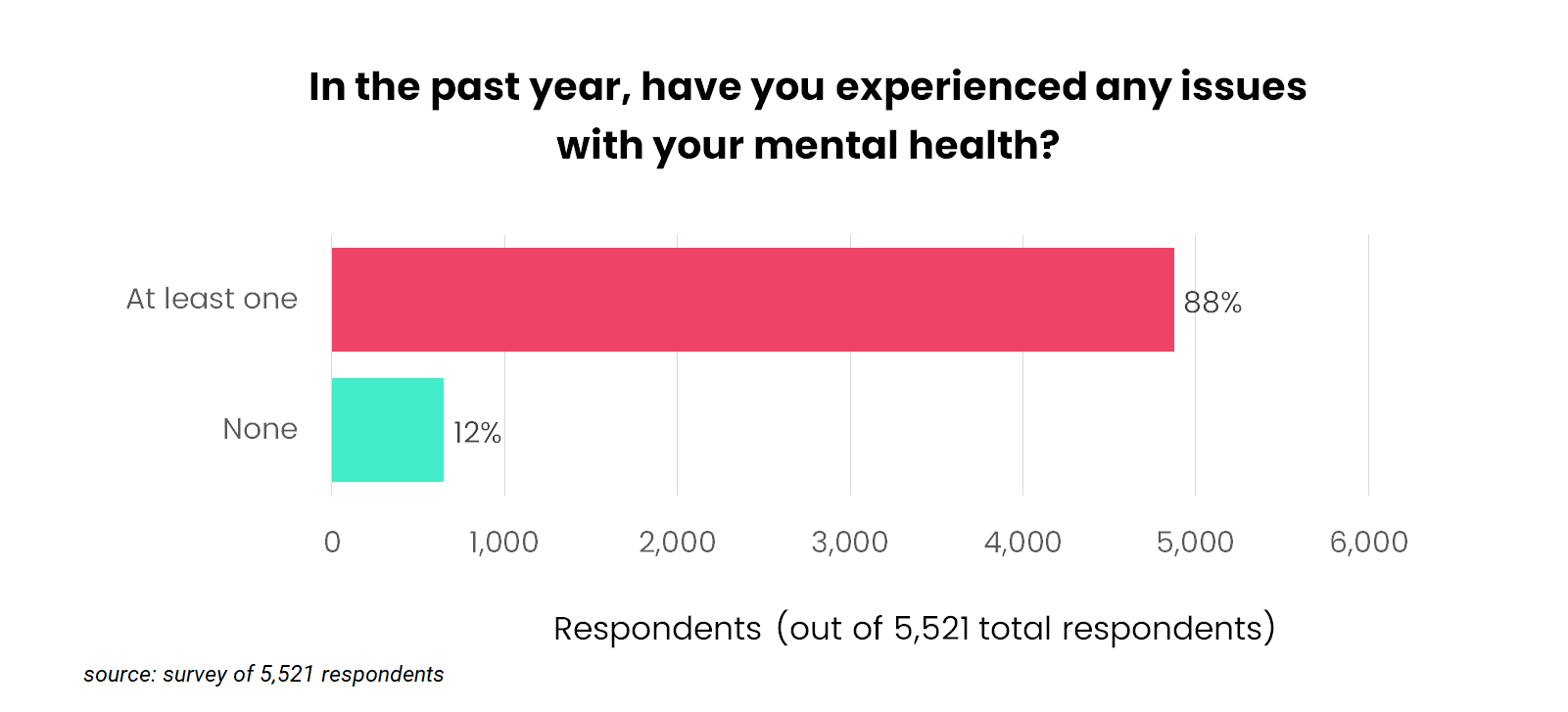
88% of the people you meet have been struggling with at least one mental health issue over the past year.
Respondents were asked to select mental health issues from a list. Here are the most frequently occurring mental health issues that our respondents dealt with over the past year.
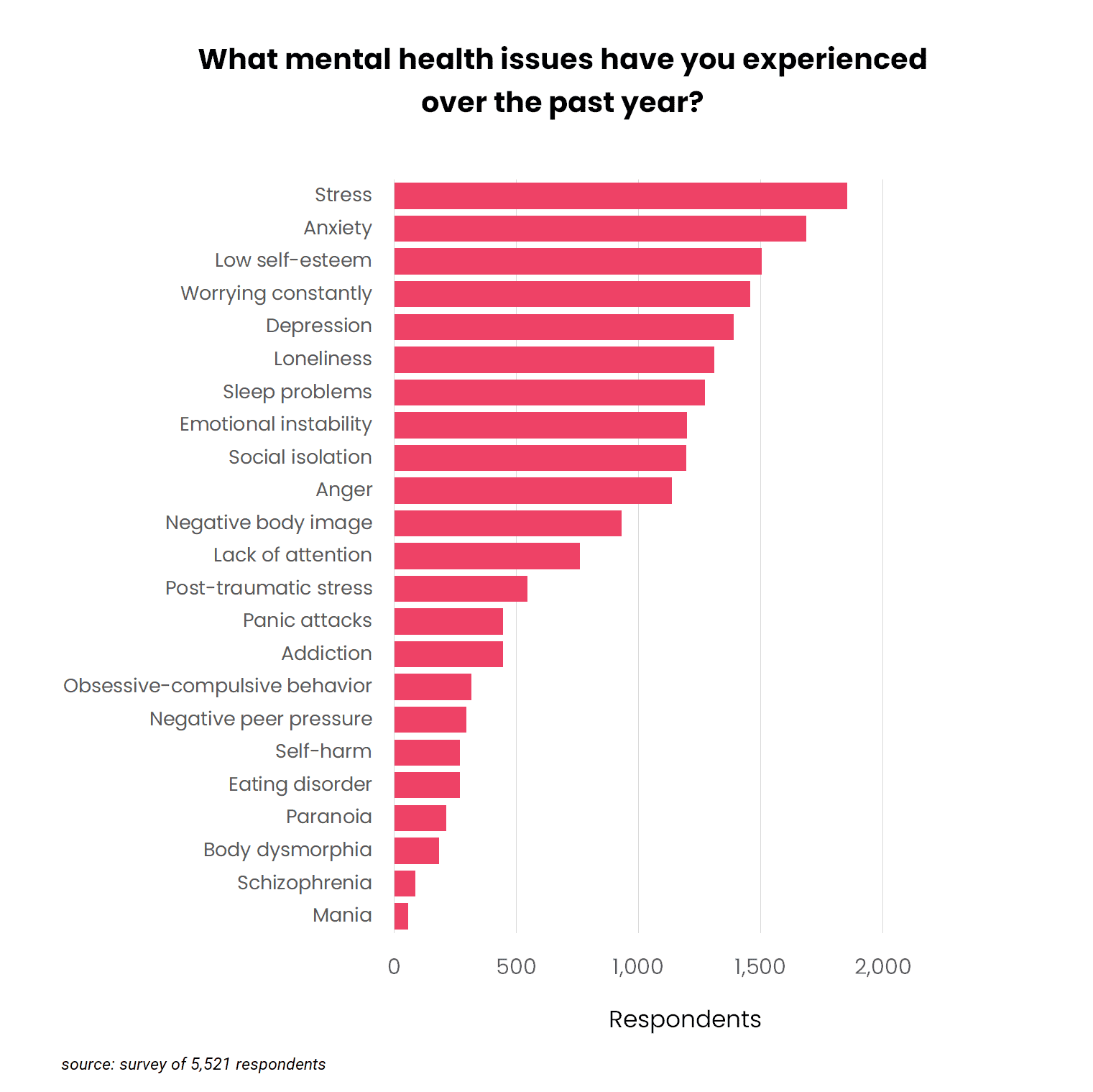
The mental health issues that people struggle the most with are stress, anxiety, low self-esteem, worrying constantly, and depression.
This bar chart includes all chosen mental health issues. Some respondents selected more than one of this list. As a result, the total count of mental health issues in our dataset is larger than the number of respondents who answered our survey.
On average, a person struggles with 3 mental health issues
We found that the average respondent in our survey admits to having struggled with at least 3 mental health issues over the past year.
Here’s a histogram that shows the number of struggles our respondents have dealt with over the past year:
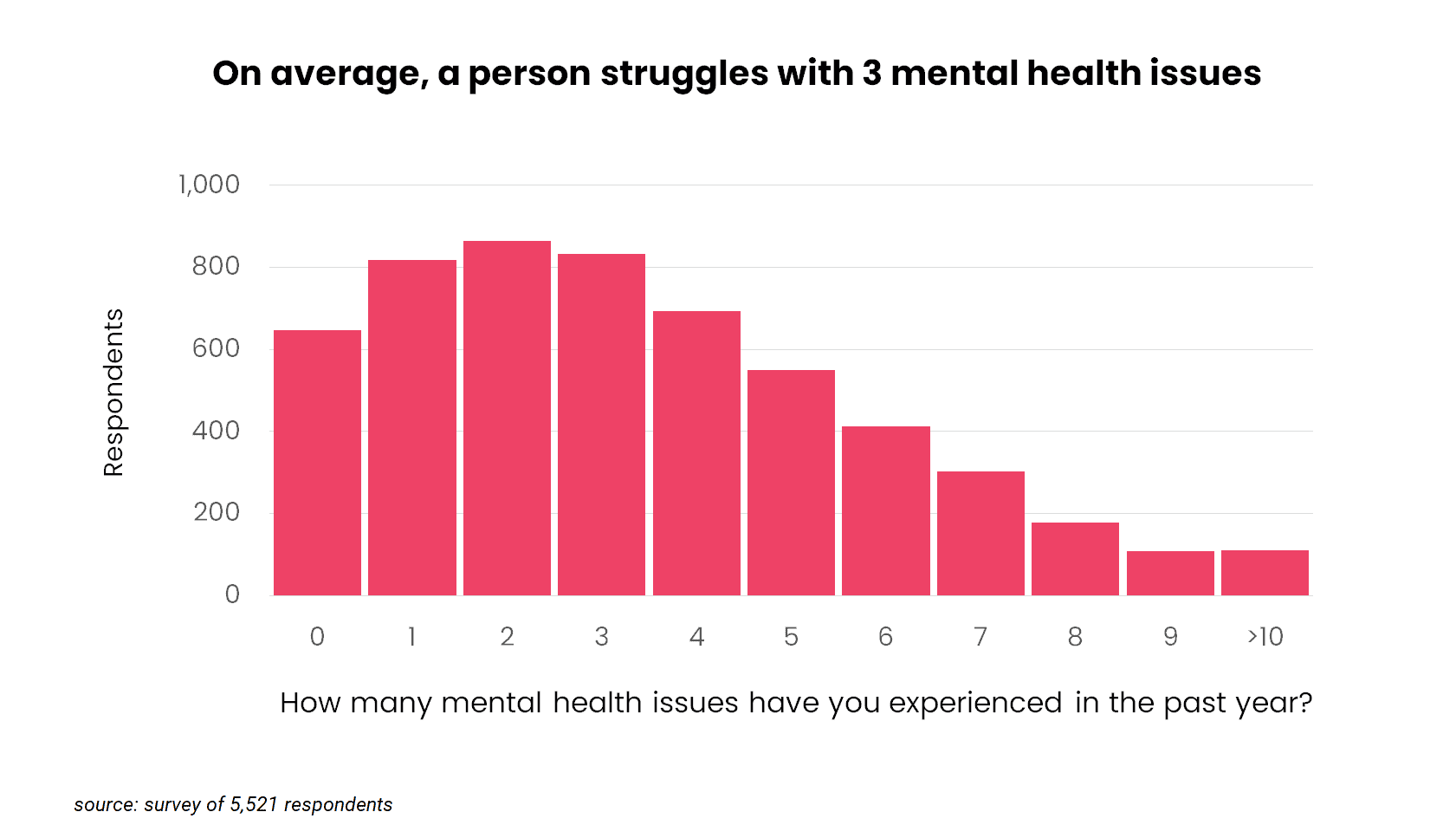
It’s important to note that this data doesn’t offer any insights into the severity of these issues. For example, if a respondent struggled with stress during a single chaotic period at work, then that person may have selected rightfully selected “Stress” as a mental health issue.
Nonetheless, it’s telling that 88% of respondents are dealing with at least one issue and that the majority of our respondents are struggling with at least 3 mental health issues.
One in four people is diagnosed with a mental health disorder
In order to get more insight into the severity of these mental health issues, we asked the following questions:
- Have you been officially diagnosed with one of these issues?
Of our 5,521 respondents, a total of 1,443 stated that they have received an official diagnosis of their mental health issue.
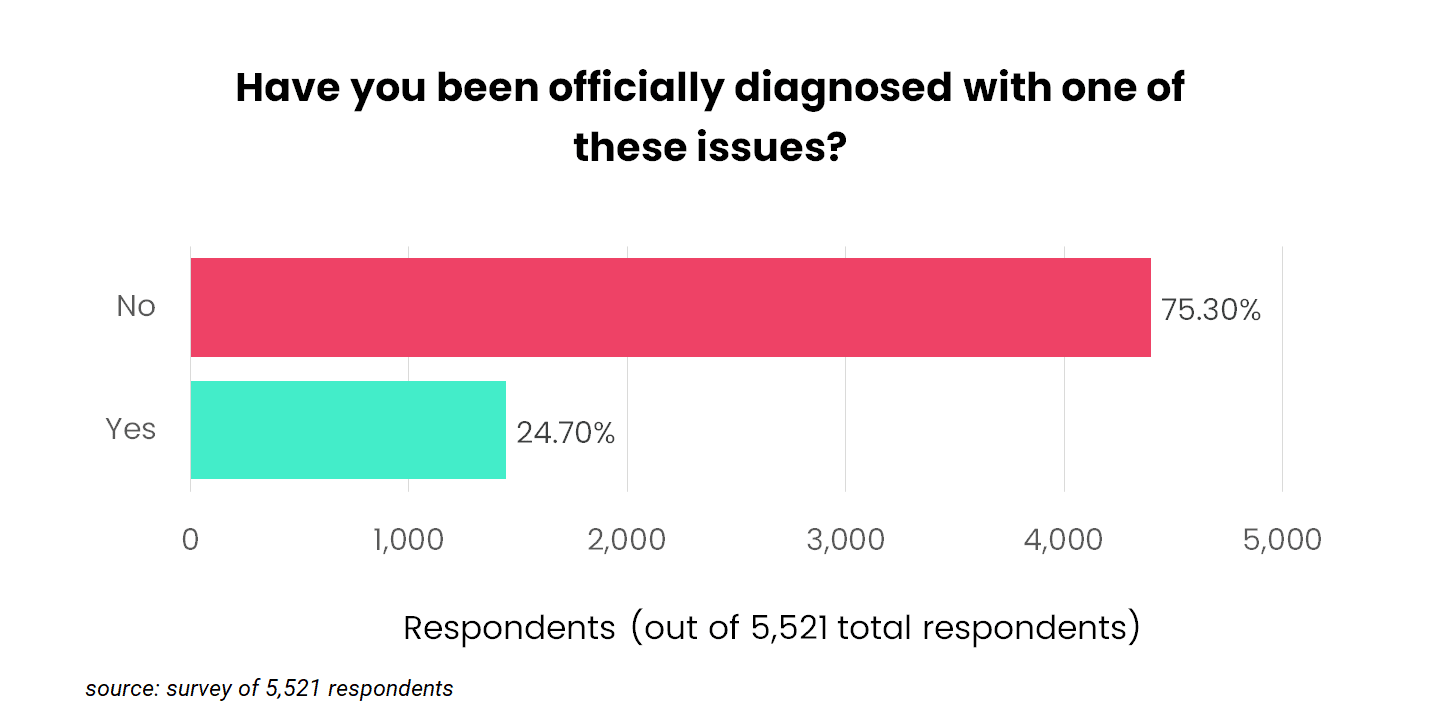
25% of people are officially diagnosed with at least one mental health issue.
If we only look at the issues that were officially diagnosed, we find that the 3 most occurring mental health issues are:
- Depression (n=424)
- Stress (n=404)
- Anxiety (n=393)
25% of people don’t feel comfortable sharing their struggles with anyone
We asked our respondents if they feel comfortable talking about their mental health issues with someone:
- Who do you feel comfortable with talking about your issues?
This resulted in the following answers:
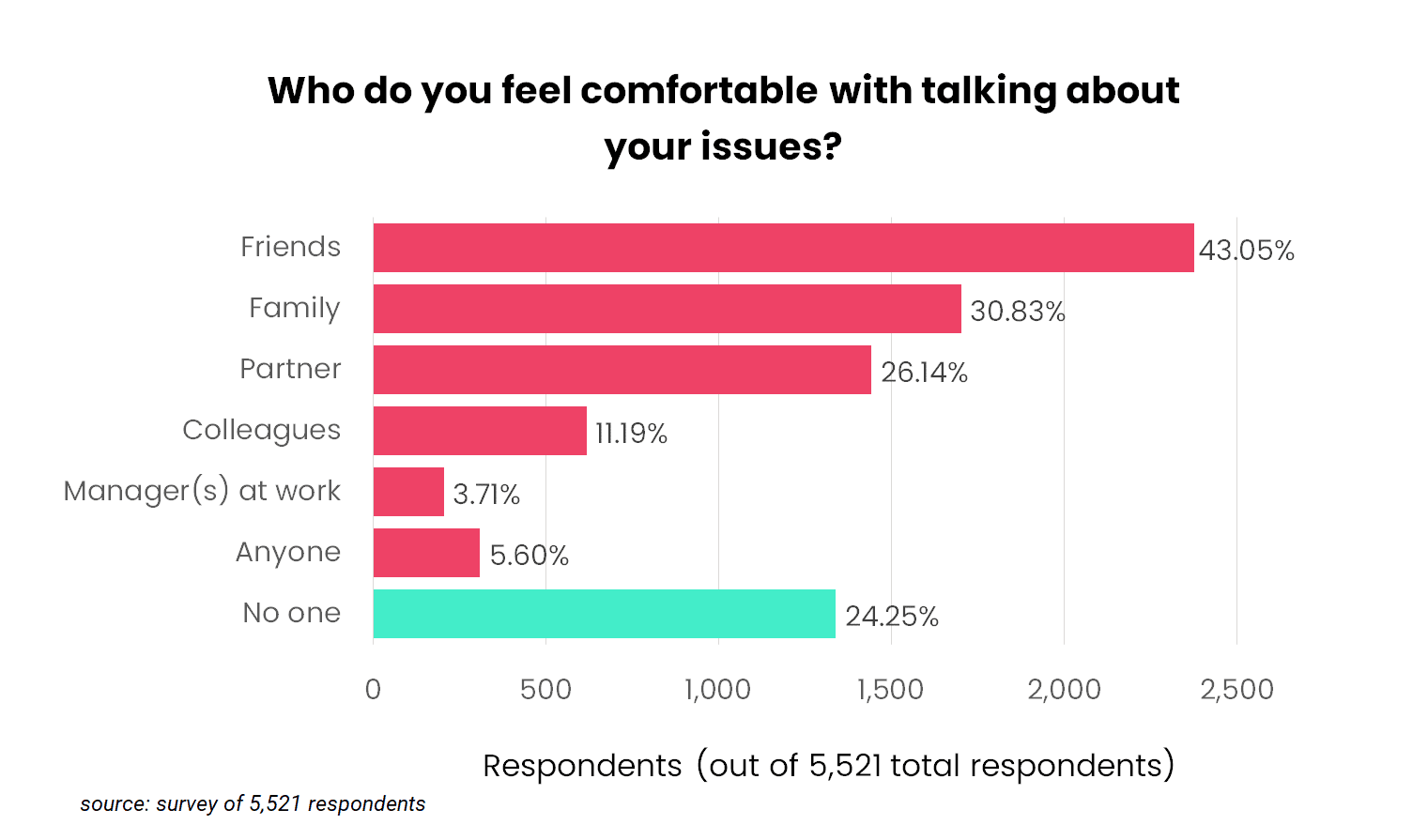
We found that 24.25% of people don’t feel comfortable talking about their struggles with anyone, no matter who that is.
Only 5.6% of our respondents feel comfortable discussing their mental health issues with anyone.
Interestingly, our respondents were more likely to discuss their mental health struggles with their friends and family than with their partners. This may be caused by the demographics of our respondents, as people who are single don’t have the possibility to discuss their issues with a partner.
Mental illness stigma in the workplace
Our study shows that the mental health stigma is most apparent in the workplace.
Only 12% of respondents who struggle with issues of mental health are comfortable talking about it in the workplace.
Interestingly enough, people are far less likely to discuss mental health with their manager(s) as opposed to a regular colleague.
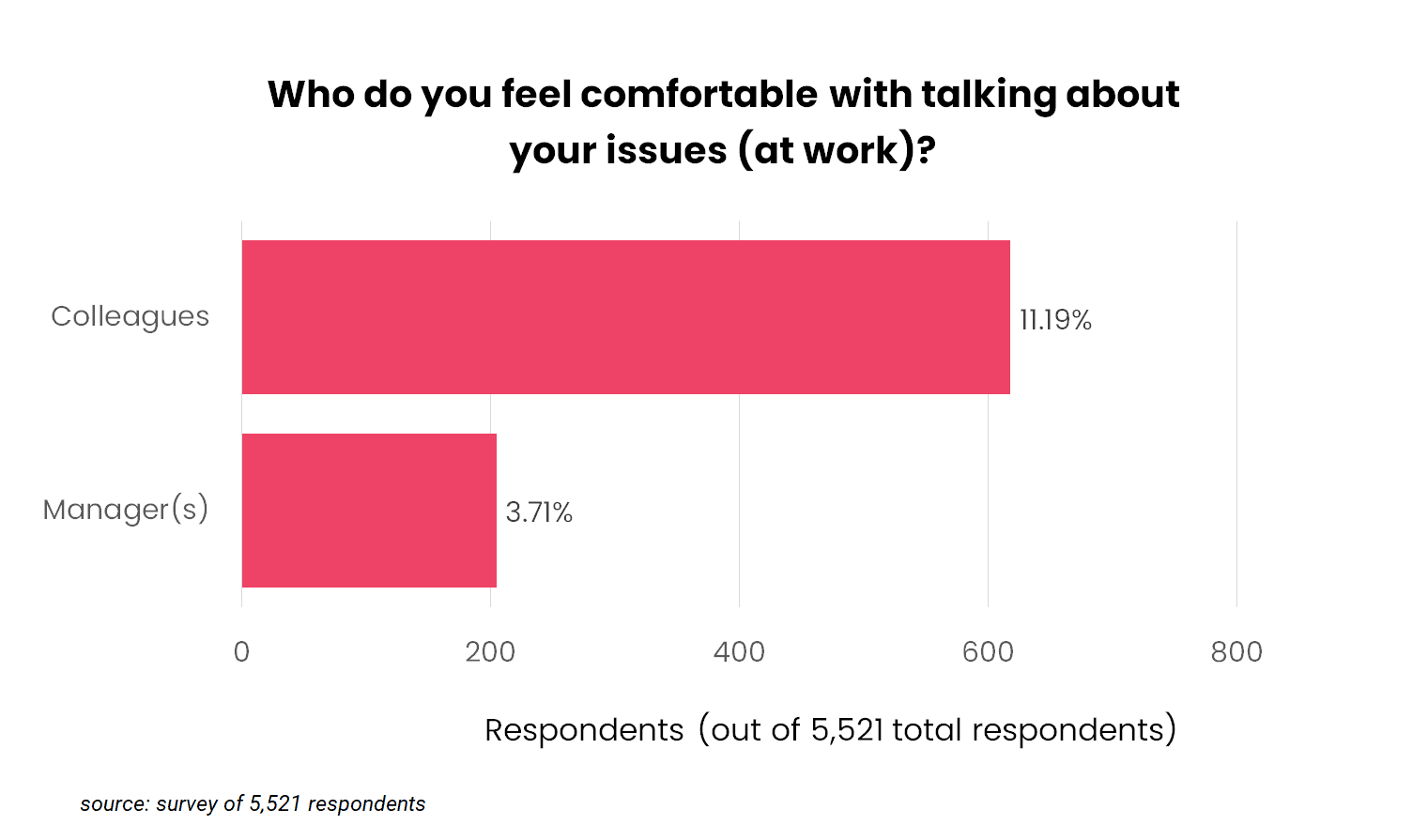
Only 3.71% of people feel comfortable talking with their manager(s) about their mental health issues.
This means that if you’re a manager, it’s highly likely that members of your team aren’t sharing their struggles with you.
The happiness impact of mental health disorders
We asked every respondent the following question:
- Have any of these mental health issues affected your happiness level?
62% of people admitted that their happiness was negatively impacted by mental health issues.
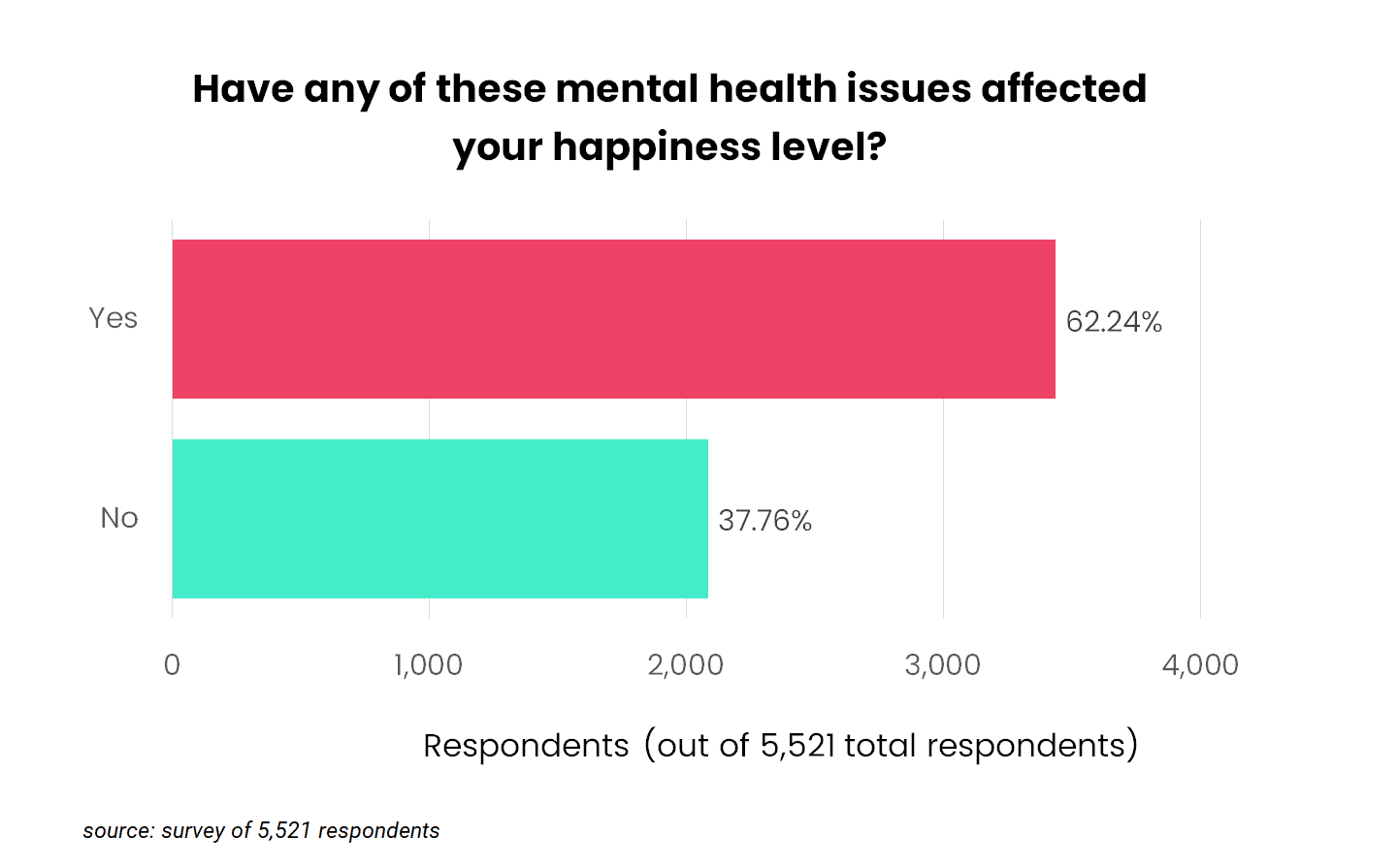
That means that the remaining 38% struggle with mental health, but not enough to notice a negative impact on their mental well-being.
On average, people who struggle with their mental health are 23% less happy
We asked our respondents about their happiness levels:
- If you look back at the last year of your life, how would you rate your happiness on a scale from 1 to 10?
We found that, on average, people dealing with mental health issues are 23% less happy than those who don’t.
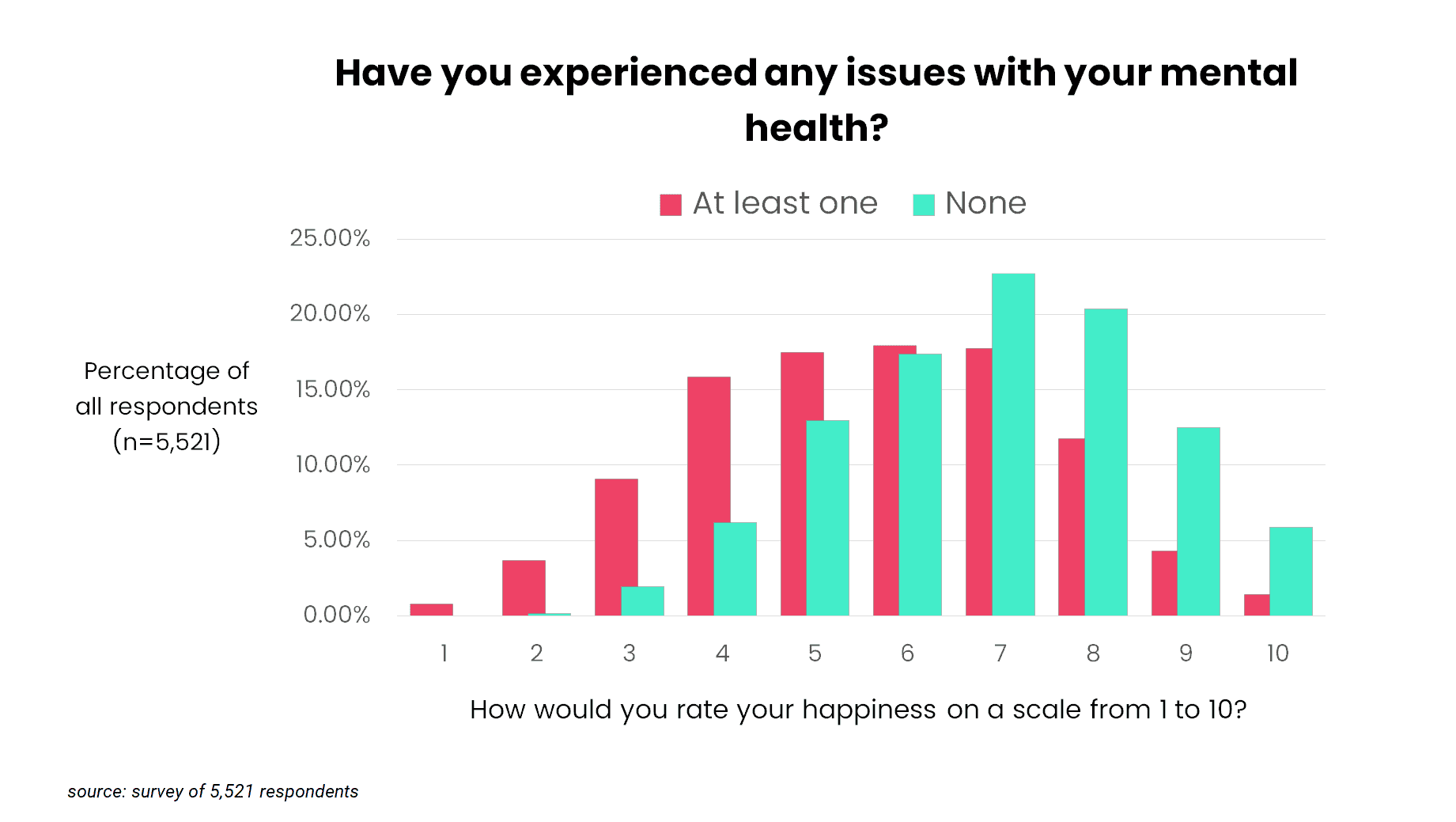
Respondents were first asked about their happiness, without knowing that our survey was going to ask them about mental health struggles.
The average happiness rating of the respondents who don’t struggle with issues is 6.93.
On the other hand, the average happiness rating of those who struggle with at least 1 mental health issue is 5.65 (-23%).
People who struggle with their mental health are 23% less happy
We’re refraining from sharing ranking the average happiness of respondents based on the issues they’re dealing with. While interesting, we believe ranking mental illness from best to worst can result in a negative impact on this topic. As long as the mental illness stigma exists, information like this may be used in a way that is harmful. For now, we choose to only release the data from our survey that we feel contributes positively to a transparent and open discussion on the topic of mental illnesses.
14% of respondents don’t seek help out of shame or embarrassment
We asked our respondents why they aren’t seeking help for their mental health issues.
Here are the results:
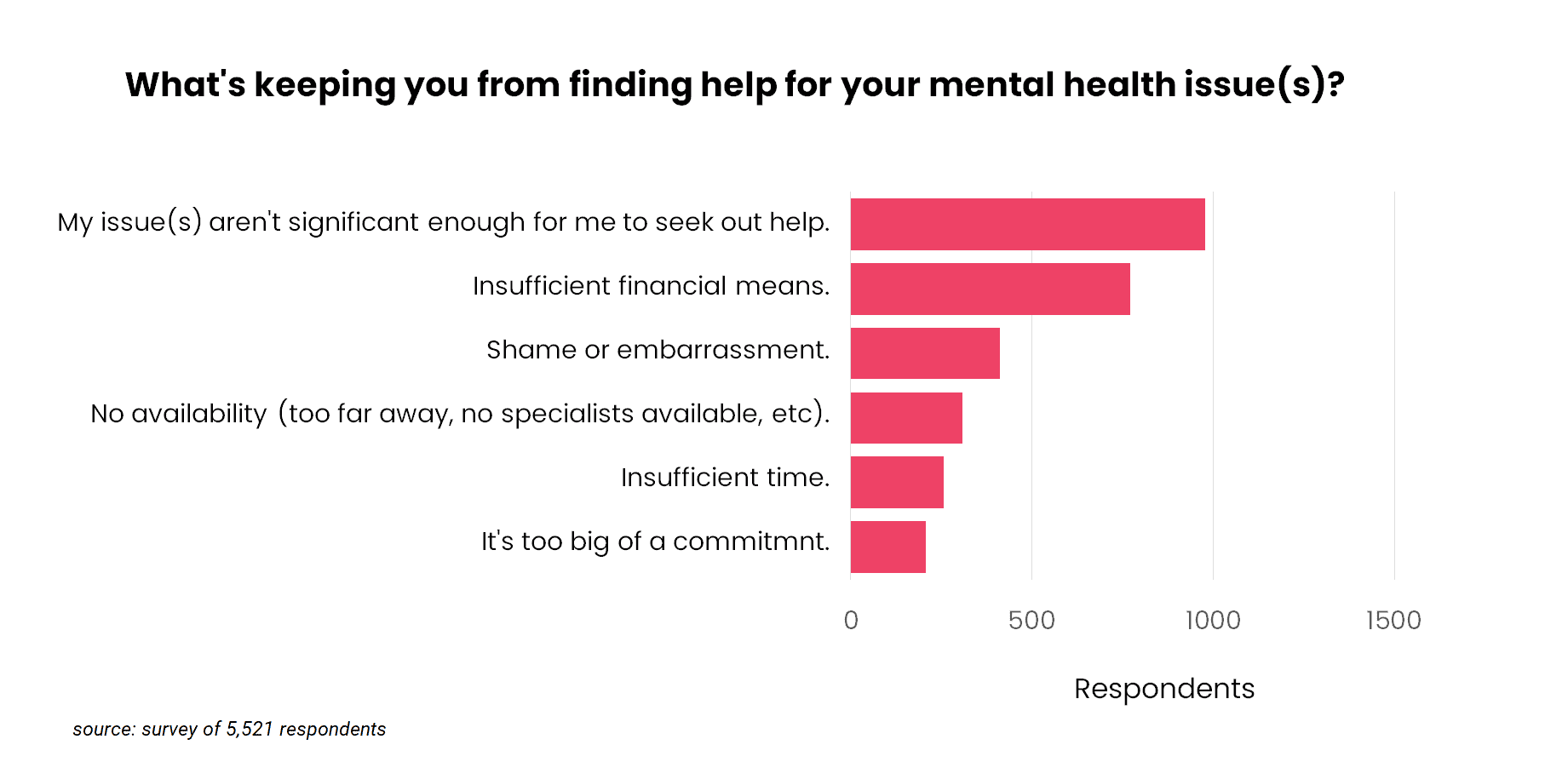
The most common reason for people to not seek help for their mental health issues is that they don’t consider them to be significant enough.
Of the 4,875 respondents who admitted to struggling with mental health, 2,411 are not receiving help.
Of these 2,411 who don’t receive help, 411 respondents claim to do so out of shame or embarrassment.
17% of people who refrain from receiving help for their issues claim to do so out of shame or embarrassment.
978 respondents don’t seek help because they find their issues not significant enough. Interestingly, 692 of these respondents (71%) admit that their issues have affected their happiness in the past.
Some of our respondents also shared other reasons for not seeking or receiving help:
- “I lived with mental health for so long, and I accepted it as part of my life.”
- “I practice my own self-care techniques to manage these challenges.”
- “I’ve tried therapy, but it either wasn’t a match or it didn’t help. But I still want to get help.”
Commentary from the team:

Hugo Huijer, Founder of Tracking Happiness
Breaking the mental illness stigma is difficult, but it can save lives. People experiencing mental health issues often face rejection, bullying, and discrimination, especially in the workplace.
This can make their journey to recovery longer and more difficult. The more openly we talk about mental health issues, the more comfortable people become with talking openly about their issues and finding the support they need.
As our study shows, the majority of people struggle with mental health issues on occasion. The more we realize that everybody has their own struggles and challenges, the more we can show sympathy to others instead of neglect.
Methodology
Our survey consists of 5,521 respondents spread across the world. 61.2% of respondents were female, whereas 38.3% were female.
The location of respondents varied, with 38.4% coming from North America, 32.7% coming from Europe, and 23.6% coming from Asia.
Survey responses were collected between June 8, 2022, and August 15, 2022.
Responses were collected through both the Tracking Happiness newsletter and Amazon Mechanical Turk (MTurk). MTurk is a “crowdsourcing” platform where “workers” complete tasks for a paid compensation. Survey respondents were only allowed to respond once.
Illegitimate responses such as duplicate responses or responses with missing data were filtered from the results. The survey responses were completely anonymized. No personal names or email addresses were collected.
Closing words
Numerous studies have shown why it’s so important to not neglect mental health issues. But as long as a mental illness stigma exists, people are refraining from finding help, sometimes out of shame or embarrassment. We believe that this stigma needs to be eliminated, and want to use our power to contribute positively to the de-stigmatization based on data and numbers.
What’s your main takeaway from today’s study? Do you have a question about something from our analysis? Leave a comment below to let us know.
Fair use and redistribution
Tracking Happiness grants you permission to reuse, host, or repost the graphics and images from this article. When doing so, we ask that you kindly attribute the authors by linking to Tracking Happiness or this page.


Good afternoon,
I hope this finds you all well. I would be interested in Sharing My Story but could not access the Google Form. Can I ask that you forward the relevant link please. Many thanks, Nikki
I liked the Report. I have saved it for referring to it again. I have one or more mental health issues. I am not quite happy. But I don’t intend to consult anyone. I think i can take care of my problems.
Thanks for the nice words, and good luck with your struggles! 🙂